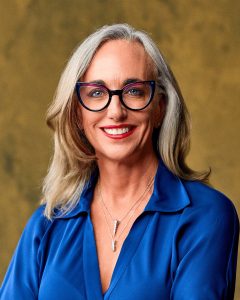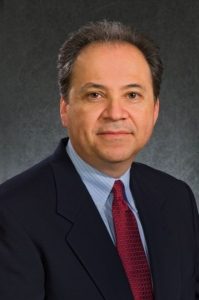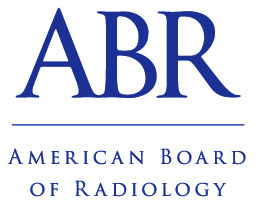After filling numerous roles over two decades as an ABR volunteer, Cheri L. Canon, MD, is breaking new ground as the Board of Governors (BOG) president.
Dr. Canon ran an ABR board meeting for the first time at the weeklong spring meeting in February. Even with all her experience, she said the task was a challenge.
“Even after being there for so long and knowing everyone so well – the staff, the Board of Trustees (BOT), and the Board of Governors – it’s still daunting when you think about a full week-long meeting knowing your role is to oversee the agenda and facilitate discussions,” she said.

Dr. Canon, who served as board president-elect for two years, moved up at the end of last year’s fall meeting in Tucson. She replaced Robert Barr, MD, who rotated off the BOG last October after spending two years as president.
She said working with Dr. Barr helped prepare her to take the spot. In turn, Dr. Canon will be partnering with John A. Kaufman, MD, MS, who’s serving as president-elect for the next two years.
“I really tried to channel my inner Bob Barr at the meeting because he was just remarkable,” Dr. Canon said. “While I learned many tactical and operational things from him, what was more important was his leadership style and how he engaged with the Board. I was very fortunate to be able to watch that for two years.”
Dr. Canon has seen the ABR from many angles. She served as an oral examiner from 2002 to 2014, was a member of the BOT from 2016 to 2018, and has been on the BOG since 2018.
The BOG is responsible for ABR financial affairs, Initial and Continuing Certification (MOC) program processes, communications, strategic planning and priority setting, intersociety relations and outreach, and application of American Board of Medical Specialty standards. Running BOG meetings means ensuring that voices are heard so that the optimal decisions are made.
“I’m collaborative,” Dr. Canon said. “I like facilitating conversations and garnering consensus. But when the time comes, I have no qualms with making a decision and moving on.”
She’s president of the University of Alabama Health Services Foundation and chief physician executive for the University of Alabama at Birmingham (UAB) Health System. Her leadership resume is almost too long to list. Highlights include serving as vice president of the American College of Radiology (ACR), chancellor on the ACR board, and chair of the ACR Commission on Education. She also earned ACR’s Gold Medal in 2021. Dr. Canon is a past president of the Society of Chairs of Academic Radiology Departments (SCARD) and the co-creator and co-director of LEAD, a women’s leadership development program jointly developed by SCARD and GE Healthcare.
With all that experience, she knows that each group requires a unique approach to achieve success.
“I flex my leadership style depending on the organization and sometimes depending on the topic within the same organization,” Dr. Canon said. “I think that’s important. Approaching everything with the same uniform style is not productive.”
There are many audiences within the ABR’s sphere, including candidates going through Initial Certification and diplomates participating in Continuing Certification. The organization also must consider the needs of its more than 1,300 volunteers.
“We need to support our volunteers by making their engagement with the ABR very efficient,” Dr. Canon said. “We have to remember that they all have day jobs, so anything they do for us is outside of their regular work hours.”
She’s happy with the BOG’s composition, pointing to the appointment of Toby Gordon, ScD, as the initial public member in 2019 and a wider range of backgrounds among its members.
“We have a broad group of perspectives represented on the BOG,” she said. “We have our first public board member and more private practice, hospital-based representation. That gives us different perspectives. It’s been refreshing.”
Fellow BOG member Desiree E. Morgan, MD, is also a colleague of Dr. Canon’s at UAB. Dr. Morgan, who has been an ABR volunteer since 1997, believes her friend is an excellent choice to help the BOG meet its responsibilities.
“Whether in the department at UAB or while volunteering for ABR, working with Cheri has been tremendously impactful for me,” Dr. Morgan said. “She is wicked smart and a fantastic colleague. Her engaging leadership style, thoughtful inclusion and consideration of differing viewpoints, and ability to steer teams toward a clear vision are attributes that will serve the public as well as our candidates and diplomates well as she leads the Board of Governors.”
There’s still plenty of work to be done. But Dr. Canon is happy with what the BOG accomplished during the spring meeting and looks forward to regular conversations with the group.
“We reaffirmed many of our prior commitments,” she said. “We had some conversations around longer-term strategy. I was pleased.”
Working with residents gives ABR volunteer Ronald Arellano, MD, opportunities to pass along knowledge he has gained as a clinical interventional radiologist and educator.
It also provides Dr. Arellano, who serves as program director for interventional radiology at Massachusetts General Hospital, with chances to learn from his trainees. One especially valuable lesson came from a resident in his program.
“One of our residents always had his computer open, working on things between cases,” he said. “We did a complex biopsy, and after it was done, I turned to him and said, ‘We should write this up as a case report.’ That was on a Wednesday. By Friday, he had a manuscript for me. By Saturday, I had edited it. We submitted it Saturday night and it was accepted on Sunday.”

A wealth of knowledge has made Dr. Arellano an excellent ABR volunteer. He was a question writer from 2019 to 2022 and has been an oral examiner for the past six years.
AJ Gunn, MD, was a trainee under Dr. Arellano and volunteers with him as an oral examiner. Dr. Gunn, a faculty member at the University of Alabama at Birmingham’s Radiology Department, said his former program director is always willing to help.
“Dr. Arellano is a patient and dedicated educator who has impacted the lives of many trainees during his career,” he said. “It is no surprise that he has taken the time to volunteer with the American Board of Radiology to broaden his impact and service to those outside his institution. As a volunteer on our oral certifying exam committee for interventional radiology, he was one of the most active and consistent members of the group and greatly contributed to the team’s success.”
Dr. Arellano started his training at the University of California San Diego with the goal of becoming a surgeon. He changed his mind based on his background as a radiology technician and a curiosity about where the field could take him.
“As interesting and good as (surgery) was, I felt that I would be more multidimensional as a radiologist,” he said.
He then faced another choice: Did he want to take the diagnostic or interventional radiology route? He was interested in imaging but the lure of more patient contact and the opportunity to perform procedures was too strong.
“I felt comfortable in the procedure rooms working with needles, guide wires, and catheters,” Dr. Arellano said. “Even though I liked abdominal imaging a lot, I decided to go with what felt right.”
To round out his training, Dr. Arellano completed fellowships at UC San Diego Medical Center in cardiovascular and interventional radiology and at Massachusetts General Hospital in abdominal imaging.
“I was able to get the best of both worlds and it’s been a gratifying and rewarding career,” he said.
Dr. Arellano has been amazed by the progress he has seen over his career as an interventional radiologist. Duties that were once tedious and more risky have become routine and much less invasive thanks to innovations in the field.
“I think about the TIPS procedure that we often do in interventional radiology,” he said. “When I was an intern in surgery, I was holding retractors for six hours while the surgeon was creating the changes in the flow dynamics that we now do in an hour or an hour and a half through a needle puncture in the neck.”
He sees even more marked progress coming in the next decade.
“It’s going to become even more refined, more sophisticated, less invasive, but with a powerful impact on patient care,” he said.
Dr. Arellano splits his weeks between clinical work and procedures with a little time for administrative tasks. His commitments, including volunteering for several associations and societies, are more manageable thanks to the education he received from watching the resident working on his laptop between cases.
“Between cases, while I’m waiting for a patient to be prepped or draped or waiting for anesthesia to get set up, I have my computer with me,” he said. “I tend to things during the day so that I can free up my evenings and my weekends. Our resident taught me the value of efficiency.”
The ABR has created a system that enables ABR diplomates to have their Continuing Certification fees paid by a representative of their organization or institution.
 To participate, diplomates can simply forward their ABR IDs and invoice numbers from their payment page to their institution’s representative, where it will prepopulate the payment form in myABR. If diplomates choose to print and deliver their invoices, representatives can manually enter the information.
To participate, diplomates can simply forward their ABR IDs and invoice numbers from their payment page to their institution’s representative, where it will prepopulate the payment form in myABR. If diplomates choose to print and deliver their invoices, representatives can manually enter the information.
Diplomates should remember that it’s their responsibility to ensure that their fees are paid by March 1. The new system can be used to pay only Continuing Certification fees.
Anyone with questions or who needs assistance should contact an ABR certification manager at information@theabr.org or 520-790-2900.


